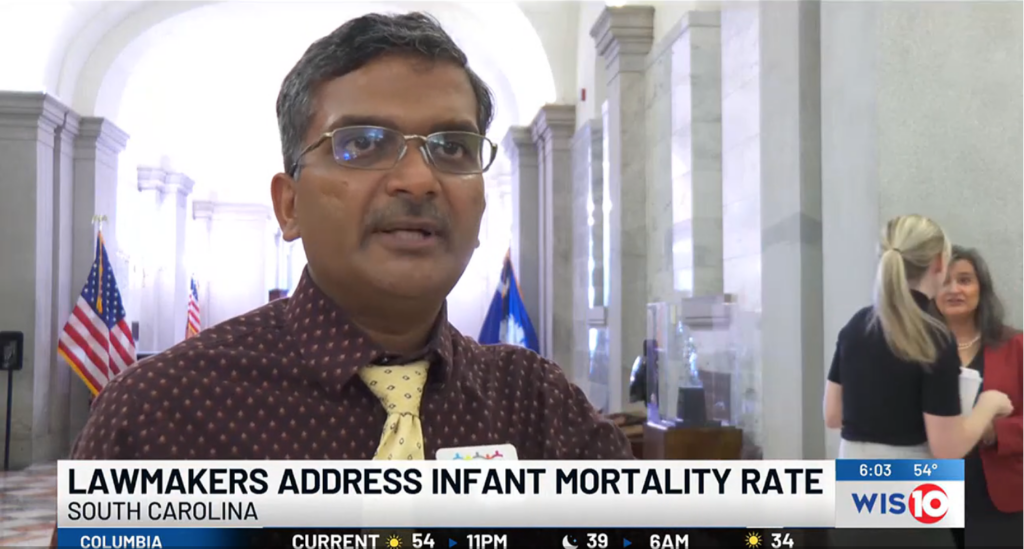By Nick Neville
COLUMBIA, S.C. (WIS) – Children’s Trust of South Carolina, an organization focused on preventing the abuse and neglect of children, urged lawmakers on Wednesday to take steps that they say will improve child care access and lower infant and maternal mortality rates in the Palmetto State.
“While we’ve made good progress over the last few years, there is still much work to be done to improve the lives of children and families in our state,” Sen. Katrina Shealy, R-Lexington, said at a press conference with Children’s Trust leadership.
The organization laid out several legislative priorities for when session begins in January.
New federal provisional data released by the Centers for Disease Control and Prevention this week shows that infant deaths are up across the nation for the first time in two decades.
While that data shows a slight decrease in the infant mortality rate in South Carolina, trends over the last several years are more troubling.
“I think it’s going to take a concerted effort on the part of the Legislature to invest in programs that would work to reverse this trend,” Dr. Ramkumar Jayagopalan, Children’s Trust board member and a board-certified pediatrician at Carolina Pediatrics, said.
CDC and DHEC data shows that there were 6.5 infant deaths per 1,000 live births in 2020
That number jumped 12 percent in 2021 to 7.3.
But in the new data from last year, the number dipped to 6.8 deaths.
Jayagopalan called that figure a “blip,” but hoped it would continue.
“I think we should do everything possible to continue that downward trend,” he said.
The organization says increasing access to home-visiting programs is key to doing that.
This is where trained professionals are paired with at-risk families, helping them give their babies a strong start in life.
Increasing access to these programs, evidence shows, can help prevent child abuse, improve school readiness, lower mortality rates and lower childhood obesity.
“It’s critically important to have a service such as home-visiting that’s voluntary, that’s accessible, that doesn’t cost anything and actually has incredible outcomes,” Dr. Elizabeth Mack, president of the South Carolina Chapter of the American Academy of Pediatrics, said. “Lowers crime, lowers hunger, improves obesity rates, all the things that we would want. It seems so magical and yet, it’s so within reach. And it’s very cheap actually to administer.”
Jayagopalan, who is also secretary-treasurer of the South Carolina Chapter of the American Academy of Pediatrics, said these professionals can pick up on critical issues that could otherwise go unnoticed.
“A few years ago, I had a family where a home-visitor picked up on jaundice in a newborn and made that mom bring that baby to me, and it turned out that baby had a critical level of jaundice,” he said. “Without that timely home visit, the consequences could have been dire.”
More families can be served if the legislature invests $250,000 into these programs, as the state would get three times that through a new federal match.
Data from a Children’s Trust study shows that currently less than 10 percent of eligible families receive voluntary home-visiting services, and more funding would help to improve that number.
The Children’s Trust is also is looking for the state to update the existing business child care tax credit so that more will use it, with child care being one of the top ten barriers to workforce entry.
A report from the State Department of Employment and Workforce shows that 15 percent of unemployed women cannot work because of a lack of child care.
Sen. Katrina Shealy, R-Lexington, said it is important not to forget about the children once they are school-aged, and is advocating for expanding free breakfast and lunch programs to all children in South Carolina public schools.
“If the people of South Carolina want kids to learn better, they want them to pay attention during class, they want teachers to be able to teach better, they’ll be on board with this,” she said.
Shealy has filed legislation on the meal program, but it stalled in both chambers last session.
According to data from the Annie E. Casey Foundation Data Center, 28 percent of South Carolina children live in households where they are not eating enough because food is unaffordable.
An increased prioritization on crisis stabilization units for children and youth throughout the state is also on the Children’s Trust’s agenda.
Source: WIS




